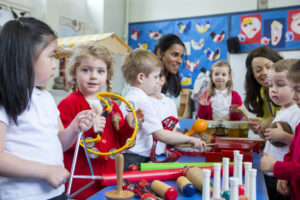 For many parents, finding the right preschool can take weeks or even months. In 2013, nearly 84% of five-year-old children were enrolled in preprimary programs, so there’s a pressure for parents to give their children the early educational experience they need to succeed. If your child has a year or two of preschool experience under her belt, she’ll probably have a high level of grade school readiness come fall. But whether your child will be attending primary school for the first time next year or you’re in need of some back to school tips for your older children, it’s never too early to start preparing. In fact, summertime provides all kinds of opportunities for continued learning. To ensure your child is ready for another year when autumn rolls around, you’ll want to follow these five tips.
For many parents, finding the right preschool can take weeks or even months. In 2013, nearly 84% of five-year-old children were enrolled in preprimary programs, so there’s a pressure for parents to give their children the early educational experience they need to succeed. If your child has a year or two of preschool experience under her belt, she’ll probably have a high level of grade school readiness come fall. But whether your child will be attending primary school for the first time next year or you’re in need of some back to school tips for your older children, it’s never too early to start preparing. In fact, summertime provides all kinds of opportunities for continued learning. To ensure your child is ready for another year when autumn rolls around, you’ll want to follow these five tips.
Sign up for summer camp
Although sports-related camps are great, there are plenty of summer camps with an educational spin that will keep your children engaged and growing. These camps may be run through local organizations, museums, community centers, or even your school. Whether your child loves fun science experiments, has an interest in animals, or wants to explore faraway lands and planets, there’s likely a camp that can get them thinking and learning. Maintaining an active mind is one of the best back to school tips we can offer.
Drop everything and read
Making regular trips to your local library and setting aside read-aloud time can make a huge difference in your students’ interest in reading and in their reading comprehension levels. Many libraries have story time for local kids and may even host reading contests to see who can read the most books during the summer. If you’re able to make reading magical, rather than a chore, your children will seek out books instead of shying away from them. The key is getting children excited about reading. You could even act books out at home or create companion activities to the books you read together.
Encourage creative expression
If your child knows how to write, creative writing can be a fantastic outlet and can help them express their thoughts and feelings. You can encourage them to write a paragraph every day or help them write a few sentences and let them illustrate a picture to go along with it. In general, creativity begets creativity; in other words, their participation in a creative outlet — like performing, arts and crafts, storytelling, or even playing games — can make them more innovative in other parts of their life. They’ll learn to think outside the box and solve problems in new ways. This can be just as important for their development as any other educational activity.
Make math delicious
Numbers and math may not appeal to many kids, but you can help make them a bit more accessible — and yummy. Get your child involved in making healthy treats in the kitchen. You’ll pique their interest with the promise of deliciousness and will manage to bake some math right in. While younger children won’t grasp exactly how measurements relate to numbers, you’re still solidifying the idea that by combining several parts, you’re making a whole new recipe.
Visit local museums
During the summertime, your local museums are a great resource for learning and a welcome escape from the heat or rainstorm. Museums have exhibits that truly make learning fun for children. With focuses on science, math, nature, history, and even play and how it helps kids grow, these centers will soon become a favorite for your children. Many museums will even offer discounts for families during the summer season as a way of encouraging educational activities during the break.
To find out more about area summer camps or to learn more about our preschool programs, contact Learn and Grow Academy today.



 Most parents know how important academic preschool programs can be for their child’s future development. The best preschools will help prepare your son or daughter for the language, math, and social skills they need to succeed in elementary school and beyond. But just because school will soon be out for the summer, that doesn’t mean your child can’t continue his or her educational, social, and emotional growth through an academic preschool curriculum. Let’s take a closer look at a few of the reasons why you should enroll your child in a preschool program for the summer.
Most parents know how important academic preschool programs can be for their child’s future development. The best preschools will help prepare your son or daughter for the language, math, and social skills they need to succeed in elementary school and beyond. But just because school will soon be out for the summer, that doesn’t mean your child can’t continue his or her educational, social, and emotional growth through an academic preschool curriculum. Let’s take a closer look at a few of the reasons why you should enroll your child in a preschool program for the summer. Without a preschool education, almost 25% of at-risk children were found to be more likely to drop out of high school, according to a study by the Ounce of Prevention Fund. However, kids who do attend preschool are not only less likely to drop out of high school, but they’re also more likely to graduate from college, own a home, and start a happy family of their own.
Without a preschool education, almost 25% of at-risk children were found to be more likely to drop out of high school, according to a study by the Ounce of Prevention Fund. However, kids who do attend preschool are not only less likely to drop out of high school, but they’re also more likely to graduate from college, own a home, and start a happy family of their own.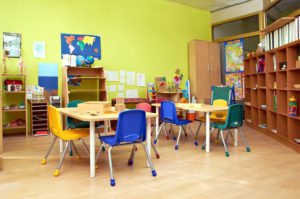 Considering that 75% of children in the U.S. participate in academic preschool programs, most new parents will have to quickly make a decision about early education. And because preschool education activities can play such an important role in your child’s development, it’s a decision that requires careful consideration. With all of the educational options at your disposal, it can be tough to figure out which academic preschool program will be best for your child’s needs. While each family is different, there are a few consistent things to look for in a preschool.
Considering that 75% of children in the U.S. participate in academic preschool programs, most new parents will have to quickly make a decision about early education. And because preschool education activities can play such an important role in your child’s development, it’s a decision that requires careful consideration. With all of the educational options at your disposal, it can be tough to figure out which academic preschool program will be best for your child’s needs. While each family is different, there are a few consistent things to look for in a preschool.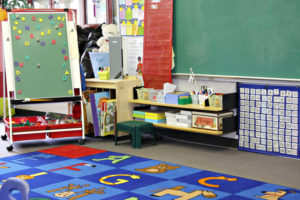 In 2013, a good portion of toddlers were enrolled in preprimary programs. Around 42% of three-year-olds and 68% of four-year-olds attended preschool programs that year. Many parents understand that, in theory, the high quality education their children receive in academic preschool programs will ensure grade school readiness. But they may not be entirely sure how common preschool activities will allow for the acquisition of valuable skills. To help you better understand how the typical academic preschool curriculum will help your child develop and learn, here are just some of the skills you can expect them to acquire.
In 2013, a good portion of toddlers were enrolled in preprimary programs. Around 42% of three-year-olds and 68% of four-year-olds attended preschool programs that year. Many parents understand that, in theory, the high quality education their children receive in academic preschool programs will ensure grade school readiness. But they may not be entirely sure how common preschool activities will allow for the acquisition of valuable skills. To help you better understand how the typical academic preschool curriculum will help your child develop and learn, here are just some of the skills you can expect them to acquire. If you are a new parent, choosing between preschool and daycare may seem like a rather difficult decision at first. Not only do you want to make sure your child gets the most out of the program, but you need to find something that fits into your schedule as well. In this article, we will point out some of the noticeable differences between preschool and daycare programs, and highlight why preschool is a better option for your child’s development.
If you are a new parent, choosing between preschool and daycare may seem like a rather difficult decision at first. Not only do you want to make sure your child gets the most out of the program, but you need to find something that fits into your schedule as well. In this article, we will point out some of the noticeable differences between preschool and daycare programs, and highlight why preschool is a better option for your child’s development.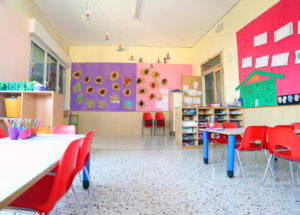 It can be all too easy to overlook the benefits gained from enrolling your child in preschool. Many parents see preschool as nothing more than structured playtime for a few hours of the day. In fact, the number of 5-year-old children enrolled in preprimary programs dropped by 5% between 1989 and 2013 (from 89% to 84%), according to the National Center for Education Statistics. Nevertheless, enrolling a child in preschool can make a great difference in both their home life and their grade school readiness. Here is a list of ten extraordinary benefits your child can gain from attending preschool.
It can be all too easy to overlook the benefits gained from enrolling your child in preschool. Many parents see preschool as nothing more than structured playtime for a few hours of the day. In fact, the number of 5-year-old children enrolled in preprimary programs dropped by 5% between 1989 and 2013 (from 89% to 84%), according to the National Center for Education Statistics. Nevertheless, enrolling a child in preschool can make a great difference in both their home life and their grade school readiness. Here is a list of ten extraordinary benefits your child can gain from attending preschool.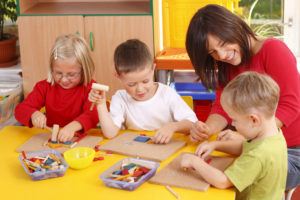 When parents seek out daycare alternatives, the benefits of academic preschool tend to win over families who want their children to develop both intellectually and socially. In fact, the number of three- to five-year-olds enrolled in preprimary programs like nursery school and preschool increased from 59% to 65% from 1990 to 2013. That means that the majority of parents understand that preschool education activities are highly advantageous for their children in terms of how they grow and learn.
When parents seek out daycare alternatives, the benefits of academic preschool tend to win over families who want their children to develop both intellectually and socially. In fact, the number of three- to five-year-olds enrolled in preprimary programs like nursery school and preschool increased from 59% to 65% from 1990 to 2013. That means that the majority of parents understand that preschool education activities are highly advantageous for their children in terms of how they grow and learn. When it comes to choosing a childcare provider for your family, you’ll undoubtedly have several options to choose from. While around three-fourths of young children in the U.S. participate in a preschool program, other working parents rely on family members or
When it comes to choosing a childcare provider for your family, you’ll undoubtedly have several options to choose from. While around three-fourths of young children in the U.S. participate in a preschool program, other working parents rely on family members or  Children go to school to learn new things, but their education shouldn’t stop there. Even in your child’s day-to-day life, it is important to remind them about the lessons that they’ve learned.
Children go to school to learn new things, but their education shouldn’t stop there. Even in your child’s day-to-day life, it is important to remind them about the lessons that they’ve learned.